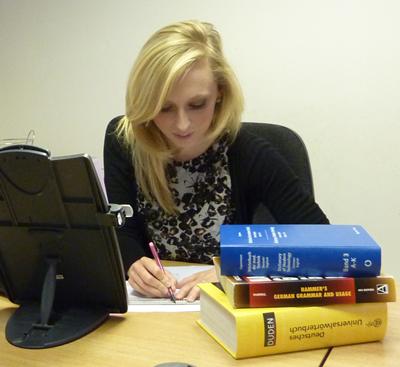Hannah Critoph BA French and German, 2009
Translator

Hi, I'm Hannah Critoph and I studied BA French and German within Humanities at the University of Southampton.
My job involves using my in-depth knowledge of French and German which I gained from my degree and the understanding I have built up in respective technical fields to render foreign langauge documents into high-quality English.
What was your degree when you studied at Southampton and when did you graduate?
I studied French and German, graduating with first class honours in 2009.
Why did you choose to study at Southampton?
Aside from being attracted by the solid reputation of the modern languages department, I found the modules available appealing, particularly the French literature modules examining the works of the likes of Simone de Beauvoir and Annie Ernaux.
Where do you work and what is your job role?
After graduating from Southampton, I obtained a full competitive grant from the Arts and Humanities Research Council to study for an MA in translation. From there, I went on to complete traineeships with the translation and editing departments of the European Patent Office (EPO) in Munich and the European Central Bank in Frankfurt.
I remained at the latter for an academic year just as the economic crisis was at its peak! Following a period spent translating for various banks in Luxembourg, I am now working for a translation company providing language services to international law firms throughout Western Europe. Given my institutional background, I focus primarily on the legal correspondence exchanged between these law firms and the likes of the EPO and the Office of Harmonisation for the Internal Market, as well as on any financial-related material our clients may send.
My job entails using my in-depth knowledge of my foreign languages and the understanding I have built up in the respective technical fields to accurately render French and German documents into high-quality English.
What aspects of your degree do you use in your day-to-day job?
The documents I work with on a day-to-day basis are so linguistically complex, with sentences in German documents sometimes spanning a couple of pages or more, that I would not be able to carry out my work had Southampton not equipped me with a comprehensive knowledge of the grammar and intricacies of the French and German languages, as well as an appreciation for nuance in my own mother tongue.
Did you enjoy your time at Southampton - what memories stand out from your time here?
I will never forget the teaching staff at Southampton and know that I would not be where I am today were it not for their support and belief in me. Staff members are approachable, passionate about their specialist areas and genuinely interested in helping each student reach their maximum potential. They all adopt an open-door policy and are always happy to listen to student concerns.
How did the University help you prepare for employment?
It was in my final year at Southampton that I first decided that I wanted to go into translation, after so enjoying the intellectual debate that would arise in our fourth-year translation seminars as we collectively sought to solve the linguistic puzzles presented by the challenging and entertaining texts picked out for us. My resolve to go into this field was then cemented by a visit from a linguist working at the European Commission, who painted a picture of a demanding career offering permanent intellectual stimulation – just what I was looking for!
Throughout my time at the University, I made sure that I took advantage of every opportunity to enhance my CV and to make myself more employable. For example, I acted as a Student Ambassador, which entailed giving up one afternoon a week to supervise language classes at a local school, with the remit of raising aspiration among pupils and promoting modern languages. In addition, I chose to spend my year abroad as an English Assistant in France. Standing in front of a classroom of teenagers and trying to hold their attention does wonders for your communication skills and self-confidence!
Finally, with the help and support of staff within the department, I was successful in obtaining a grant from the DAAD (“Deutscher Akademischer Austauschdienst” or “German Academic Exchange Service”) to undertake a summer course at a German university. I found the experience to be so enjoyable and beneficial to my German skills that I funded my way through another summer course the following year. Taking part on such study programmes definitely helped me to prove to MA admissions tutors and then to prospective employers that I was serious about mastering the German language.
What advice would you give to current students in order to help them get one step ahead of the competition?
If you have a flair for learning languages, don’t stop at one, unless you are studying on a joint honours programme incorporating study of law or business, for example. Unless your one language is Chinese, you are likely to have a hard time in the job market with one language, as most employers (including all the European and international institutions) will demand a minimum of two foreign languages. On the advice of my colleagues at the ECB, I am currently in the process of adding two further languages (Italian and Croatian) to make myself stand out from the crowd.
For many of the obvious big employers of language graduates, knowledge of current affairs is important, so students should keep themselves up-to-date with what is happening across the globe and particularly in those countries where their languages are spoken.